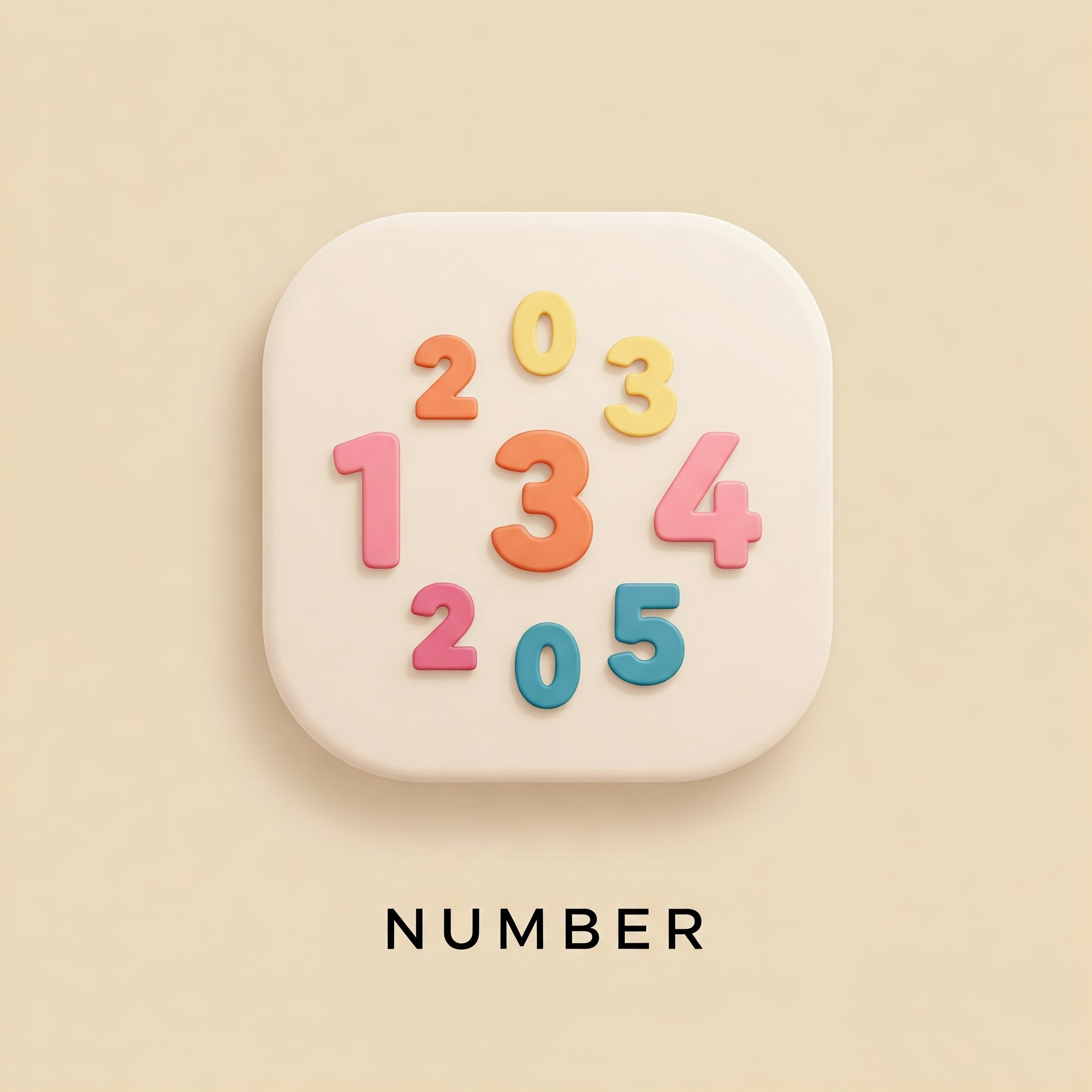Number
Definition
Number is a noun and a verb. As a noun, it refers to a mathematical value used for counting, measuring, or labeling. It can also mean a quantity, a group, or an individual instance of something. As a verb, it means to assign a number to something or to include within a group.
Parts of Speech
- Noun
- Verb
Pronunciation
American English
- IPA Pronunciation: /ˈnʌm.bɚ/
- Respelling: NUM-bur
British English
- IPA Pronunciation: /ˈnʌm.bə/
- Respelling: NUM-buh
Etymology
The word "number" originates from Latin "numerus," meaning "quantity" or "count." It entered Middle English via Old French "nombre" during the 13th century.
Derivatives
- Numerical (adjective)
- Numerology (noun)
- Enumerator (noun)
- Numerate (verb/adjective)
- Numeration (noun)
Synonyms
- Digit
- Figure
- Quantity
Antonyms
- None
Usage
The term "number" is used in mathematics, everyday language, and various disciplines. For example, "Write down the phone number" (noun) or "The team numbered its members for identification" (verb).
Related Terms
- Arithmetic: The branch of mathematics dealing with numbers.
- Numeral: A symbol representing a number.
- Count: The act of determining a number or total.
Detailed Definitions
Noun
- A mathematical value: Used for counting, measuring, or labeling.
- Example: "Three is her favorite number."
- A quantity or amount: Refers to a group or collection of items.
- Example: "A large number of people attended the event."
- A single instance in a series: Denotes an individual element in a set.
- Example: "The lottery numbers were announced."
Verb
- To assign a number to something: Refers to marking or identifying with numbers.
- Example: "Each page was numbered sequentially."
- To count or include in a group: Refers to adding or considering as part of a whole.
- Example: "The members number over 500."
number



🇨🇳 Mandarin Chinese
- 数字
- IPA: /ʂu˥˩ ʈʂɹ̩˥˥/
- English Respelling: shùzì
- 号码
- IPA: /xaʊ˥˩ ma˧˥/
- English Respelling: hàomǎ
🇮🇳 Hindi
- संख्या
- IPA: /səŋkhjɑː/
- English Respelling: sankhya
- नंबर
- IPA: /nəmbər/
- English Respelling: number
🇪🇸 Spanish
- Número
- IPA: /ˈnumeɾo/
- English Respelling: número
- Cifra
- IPA: /ˈsifɾa/
- English Respelling: cifra
🇫🇷 French
- Nombre
- IPA: /nɔ̃bʁ/
- English Respelling: nombre
- Numéro
- IPA: /nymeʁo/
- English Respelling: numéro
🇦🇪 Modern Standard Arabic
- رقم
- IPA: /raʔam/
- English Respelling: raqm
- عدد
- IPA: /ʕadad/
- English Respelling: 'adad
🇧🇩 Bengali
- সংখ্যা
- IPA: /ʂɔŋkʰja/
- English Respelling: songkha
- নম্বর
- IPA: /nombor/
- English Respelling: nombor
🇷🇺 Russian
- Число
- IPA: /ˈtɕɪsɫə/
- English Respelling: chislo
- Номер
- IPA: /ˈnomʲɪr/
- English Respelling: nomer
🇵🇹 Portuguese
- Número
- IPA: /ˈnumeɾu/
- English Respelling: número
- Quantidade
- IPA: /kwɐ̃ˈtidadʒi/
- English Respelling: quantidade
🇮🇩 Indonesian
- Angka
- IPA: /ˈaŋ.ka/
- English Respelling: angka
- Nomor
- IPA: /ˈno.mor/
- English Respelling: nomor
🇩🇪 German
- Zahl
- IPA: /ʦaːl/
- English Respelling: zahl
- Nummer
- IPA: /ˈnʊmɐ/
- English Respelling: nummer
🇯🇵 Japanese
- 数字
- IPA: /sɯːʑi/
- English Respelling: sūji
- 番号
- IPA: /bãŋgoː/
- English Respelling: bangō
🇻🇳 Vietnamese
- Số
- IPA: /sɔ˧ˀ˨ʔ/
- English Respelling: số
- Con số
- IPA: /kɔn sɔ˧ˀ˨ʔ/
- English Respelling: con số
🇰🇷 Korean
- 숫자
- IPA: /sʰut͈ɕa/
- English Respelling: sutja
- 번호
- IPA: /pʰʌːno/
- English Respelling: beonho
🇹🇷 Turkish
- Sayı
- IPA: /sajɯ/
- English Respelling: sayı
- Numara
- IPA: /numara/
- English Respelling: numara
🇵🇰 Urdu
- تعداد
- IPA: /tʕədaːd/
- English Respelling: tadad
- نمبر
- IPA: /nʌm.bər/
- English Respelling: number





